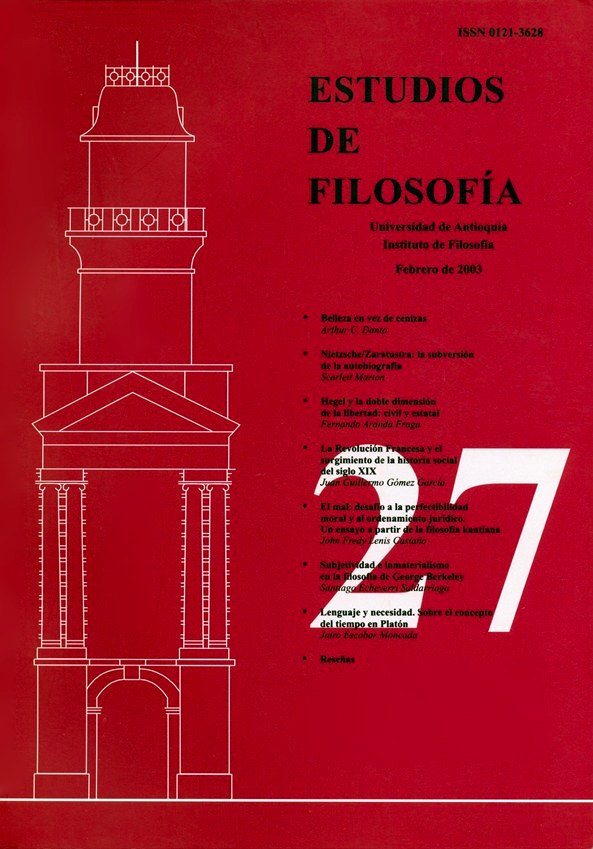The French Revolution and the rise of XIX century social history
DOI:
https://doi.org/10.17533/udea.ef.14892Keywords:
French Revolution, history, von Ranke, von Stein, Marx, TocquevilleAbstract
From its shocking events, the French Revolution (1789) has brought an the awakening of the most diverse reactions and the most unimagined ways of interpreting them. During the early decades of the XIX century, the social problem, which flourished partly as a consequence of this "aurora of the world" determined a new way to contemplate this historical-universal event. Three top-ranking intellectual personalities. Lorenz von Stein Karl Marx and Alexis de Tocqueville, who came from three different poiitieal-social and academic worlds, faced evaluating the significance of the French Revolution from the light of the convulse events of their century Their peering looks not only emphasize the inerasabte prevalence of the events that derived from 89 to Napoleon, but also, discover a social horizon for history as a decisive mark. History stops being a history of events, data or dates, in the traditional sense of a chronicle, and even history is not contemplated any longer as a rational matter in illustrated tradition. The French Revolution, thanks to these three authors, overcomes its circumstantiality in time and it rises to the category of an immanent-sense structure. In other words von Stem. Marx and Tocqueville, contrasting with Leopold van Ranke, constructed a new sense for history, particularly from the unquestionable roots of the contemporary world.
Downloads
Downloads
Published
How to Cite
Issue
Section
Categories
License
Copyright (c) 2003 Juan Guillermo Gómez García

This work is licensed under a Creative Commons Attribution-NonCommercial-ShareAlike 4.0 International License.
Authors who publish with this journal agree to the following terms:
1. The Author retains copyright in the Work, where the term "Work" shall include all digital objects that may result in subsequent electronic publication or distribution.
2. Upon acceptance of the Work, the author shall grant to the Publisher the right of first publication of the Work.
3. The Author shall grant to the Publisher a nonexclusive perpetual right and license to publish, archive, and make accessible the Work in whole or in part in all forms of media now or hereafter known under a Creative Commons Attribution-NoCommercia-ShareAlike (CC BY-NC-SA 4.0), or its equivalent, which, for the avoidance of doubt, allows others to copy, distribute, and transmit the Work under the following conditions: (a) Attribution: Other users must attribute the Work in the manner specified by the author as indicated on the journal Web site;(b) Noncommercial: Other users (including Publisher) may not use this Work for commercial purposes;
4. The Author is able to enter into separate, additional contractual arrangements for the nonexclusive distribution of the journal's published version of the Work (e.g., post it to an institutional repository or publish it in a book), as long as there is provided in the document an acknowledgement of its initial publication in this journal;
5. Authors are permitted, and Estudios de Filosofía promotes, to post online the preprint manuscript of the Work in institutional repositories or on their Websites prior to and during the submission process, as it can lead to productive exchanges, as well as earlier and greater citation of published work (see The Effect of Open Access). Any such posting made before acceptance and publication of the Work is expected be updated upon publication to include a reference to the Estudios de Filosofía's assigned URL to the Article and its final published version in Estudios de Filosofía.















